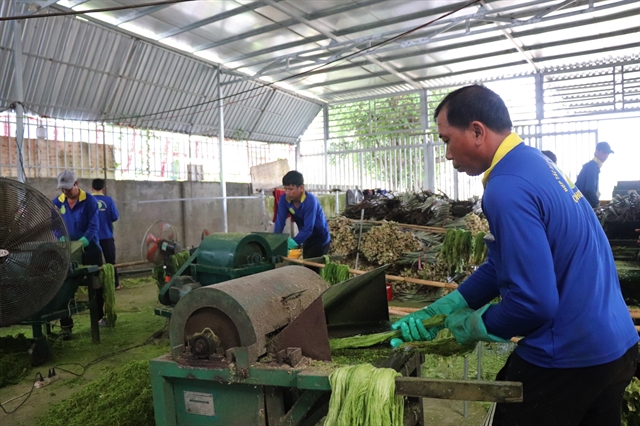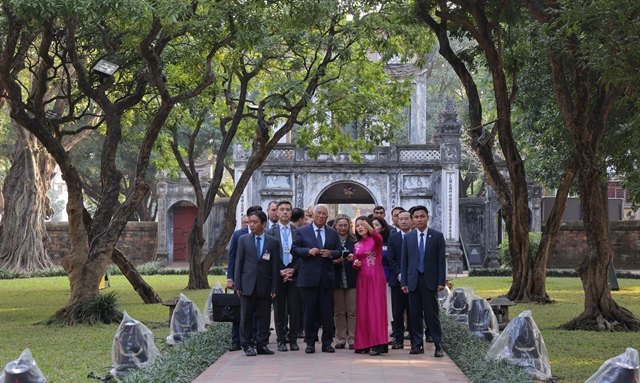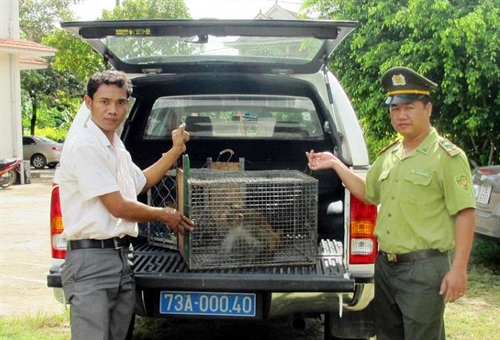 Environment
Environment

Lack of legal assistance from foreign countries means the fight against wildlife crime is still very tough.
 |
| Two yellow monkeys, a kind of rare wild animal, are received by the board of the Phong Nha-Kẻ Bàng National Park in central Quảng Bình Province. The World Environment Day is calling for zero tolerance for the illegal wildlife trade. - VNA/VNS Photo Mạnh Thành |
HÀ NỘI — Lack of legal assistance from foreign countries means the fight against wildlife crime is still very tough.
This is according to Nguyễn Duy Giảng, head of the Department for Prosecution and Supervision over Criminal Cases, under the Supreme People’s Procuracy of Việt Nam at press conference held by the United Nations in Việt Nam in response to World Environment Day (June 5).
Giảng said wildlife crime was a type of international crime, thus, legal assistance from foreign countries was very important.
“We have no agreement on legal assistance between us and other countries to deal with wildlife crime so far, he said. We just have several Memorandums of Understanding but it has shown little effectiveness.”
Giảng suggested accelerating the signing of legal assistance agreements with other countries to effectively handle wildlife crimes in the future.
He also asked the mass media to disseminate information to the public about Penal Code 2015, set to take effect on July 01, 2016, containing much stronger provisions and penalties for wildlife crime.
Under article No 234, the maximum punishment for an individual committing wildlife offences is 15 years imprisonment and a fine of VNĐ2 billion (US$89,160), for a legal commercial entity it’s VNĐ15 billion (US$668,700).
Currently, the maximum punishment is seven years in prison and a fine of about VNĐ500 million ($22,300).
"Increasing the punishments and fines aims to deter wildlife crime, and it should be widely disseminated," he said.
Zero tolerance for illegal wildlife trade
Speaking at the conference, UN Resident Coordinator and UNDP representative in Việt Nam Pratibha Mehta said the 5th of June every year marks World Environment Day, and the United Nations encourages its members to celebrate the day by raising public awareness on specific environmental challenges.
This year, the World Environment Day is calling for zero tolerance for the illegal wildlife trade, she said.
Though a lot of efforts have been made by the Government of Việt Nam, in 2014, the International Union for Conservation or Nature upgraded the threatened status of the two species of pangolin, which are native to Việt Nam, to critically endangered, she said.
Thus, the United Nations in Việt Nam urged the Government to step up its efforts to combat wildlife crime.
“Please join us in calling for zero tolerance for the illegal wildlife trade. We need to stop wildlife trafficking in its tracks,” she said.
Statistics showed that the Javan rhino was declared extinct in Việt Nam in 2011, the last one killed for its horn in Cát Tiên National Park. In April, 2016, scientists declared there may be only 5 tigers left in the wild in Việt Nam – down from an estimate of 30 in 2011. In the meantime, less than 100 elephants live in the wild in Việt Nam now – the number was nearer 550 in 1980s. — VNS